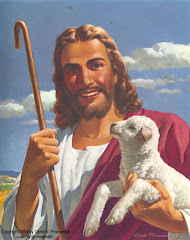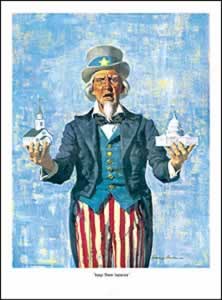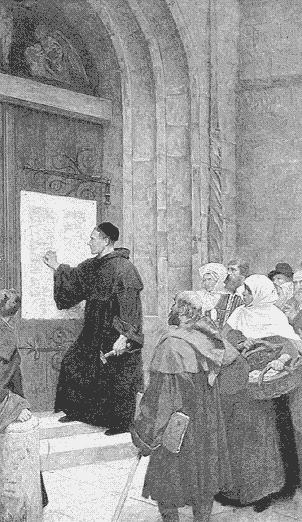God in America seeks to present a fresh narrative of the story of religion in America. While the first two chapters, presented back to back seem good, (albeit overly slanted towards the role of evangelical Christians), there is a glaring error I want to highlight that goes to the heart of the story of religious freedom and the right of individual conscience.
That this PBS documentary joins the Religious Right in eliding this important part of our history is disturbing.
So let's correct the record.
The film and the related web site contradicts itself each time the role of religion in the Constitution is mentioned:
The section on the drafting of the Constitution on the web site's "time line" of religious liberty is headlined: "U.S. Constitution drafted; no guarantee of religious liberty."
The discussion under this headline states:
"God and religion are scarcely mentioned in the document. Wanting to create 'a more perfect union,' some of the Constitution's framers fear that statements on religion would be divisive."
While it is true that there was concern about how best to approach the matter of religion, in fact there was a major statement regarding religious liberty in the Constitution thus it was not "scarcely mentioned" nor can anyone fairly say that there was "no guarantee of religious liberty" when in fact, Article Six made an extraordinary and unprecedented first cut at doing just that.
But even that dubious claim is more accurate than what is stated in the film itself. Thetranscript states:
NARRATOR: "And when, a year later, the Constitution was being drafted in Philadelphia, Jefferson and the Baptists hoped that their hard-fought principle of separating church from state would be part of the country's founding document.But when the Constitution was presented in September 1787, in not one of the seven articles was there any guarantee of religious liberty or other individual rights."
But this is a semantic spin on the facts. Article Six of the Constitution declared:
"The Senators and Representatives before mentioned, and the Members of the several State Legislatures, and all executive and judicial Officers, both of the United States and of the several States, shall be bound by Oath or Affirmation, to support this Constitution; but no religious Test shall ever be required as a Qualification to any Office or public Trust under the United States."
This was the real break between the theocratic norms of the colonial era and the democratic values of religious equality that stand at the center of the struggle of the American experiment to this day. Understandably, it was a big issue at the time, since religious oaths had been standard, and perennially controversial in most of the colonies. The abolition of "religious tests" set in motion the disestablishment of the state churches. (I wrote about the significance of Article 6 an essay, History is Powerful: Why the Christian Right Distorts History and Why it Matters in The Public Eye magazine in 2007.)
Indeed, a great deal of opposition to ratification of the Constitution centered on religion. While it is true, as the film emphasizes, many were concerned about the absence of any mention of God or Christianity in the text, many opponents were also opposed to the banning of religious tests for public office.
The Constitution was ratified by a majority of the states, but part of the politics of getting there, was a deal made with civil libertarians like Jefferson that they would support ratification for a document that they felt insufficiently guaranteed religious liberty, in exchange for the promise that the Constitution would be amended later. They did, and it was.
In an online debate at Religion Dispatches (an outgrowth of a panel at Netroots Nation in 2009), I added:
"Barring religious tests for public office in Article 6 also obviously meant that there would be no religious test for citizenship. (You can't be elected to office if you are not a citizen.) Thus the framers were clearly not solely concerned with whether or not we had official federal or state churches, but first that the right of belief resided with individual citizens.
The plumb line of this principle is clear. When Thomas Jefferson first proposed the Virginia Statute of Religious Freedom in 1777, he stated that this right of individual conscience must be extended to everyone, including: "the Jew, the Mohametan, and the Hindoo." Jefferson was not arguing the demographics of majority and minority religions, but first principles. It took time to advance them, even then. James Madison as governor of Virginia managed to push Jefferson's bill through the legislature in 1786--the year before the drafting the federal Constitution, of which Madison is credited with being the principal author--as well as the principal author of the First Amendment. Virginia had already disestablished the Anglican Church, the day after it joined the revolution in 1776. So there is no mistaking the meaning of formally extending religious liberty to all in the wake of disestablishment and as a famous forerunner to the Constitution itself."
In fairness, any story necessarily includes some facts and leaves out others in order to keep the narrative clear.
But in this case, the result is a gross distortion of the history of religious liberty in the U.S.
Other News:
















0 comments:
Post a Comment